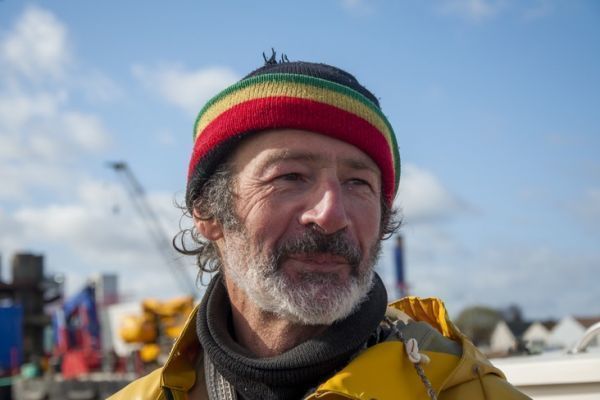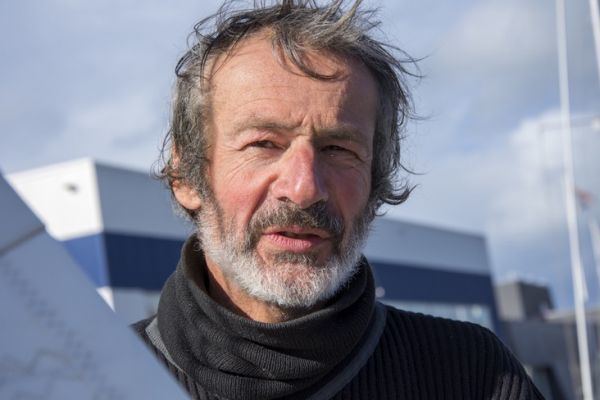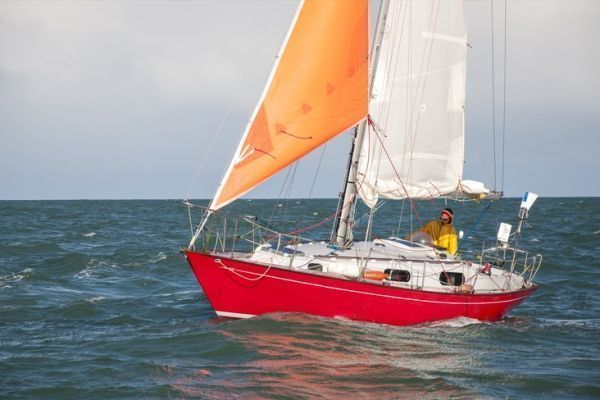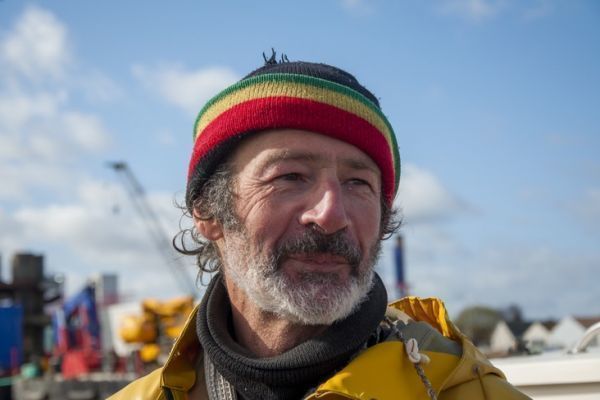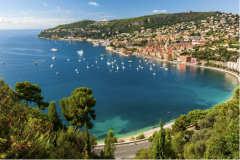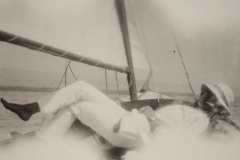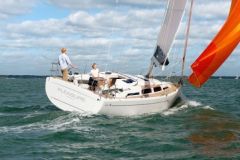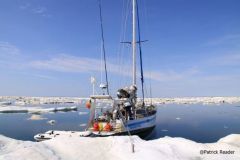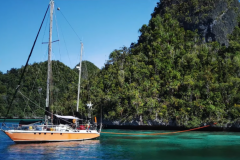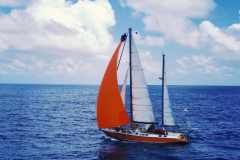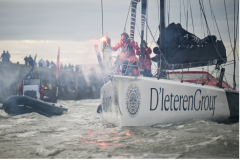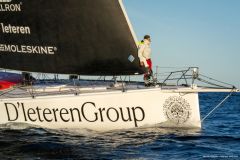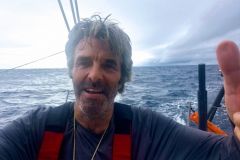What does the Longue Route mean to you? You've already taken part once, what was your experience?
Above all, it's the love of sailing. I really love sailing. This is your chance to follow your love of sailing to the end. It's a very long course. It's the perfect opportunity to express your love of sailing. I also wanted to see the Southern Ocean again. If I'm setting off again, it's because of the Southern Ocean, the middle of the South Atlantic that you cross on the way there and back, passing through the south of South Africa and Cape Horn. The conditions are tough, but there's a kind of intensity, strength and energy that you can't find anywhere else.
It's an ordeal, something you have to give a lot to, something you often have to face. It's a universe that promises nothing, but returns a lot. Whereas in civilization, many things promise much, but deliver little. Everyone says we're sailing in hostile regions, but we're not. This is nature. Hostility can be found in people, but not in nature.
In this indifferent world, it brings a lot to the table. But that's also why I like sailing, pure sailing. When I was a kid, my father often told me I was a purist. When you sail, you move with the wind, the waves... You're part of an environment in which you have to be in harmony to sail well.
In regattas, the social part isn't my cup of tea, but what I like is that whoever's doing well is sailing well. Often you go a bit too hard because you want to win, and at that point I'm not interested. What I like is to be always in touch with the universe, the sea, the wind, the sky and in harmony.
It's great to do the Long Route for that. At first I wasn't sure I wanted to go back. But I surprised myself. After the first edition, the return was extremely difficult, both psychologically and physically.
After the first edition, I arrived undernourished, because I hadn't planned enough and hadn't measured how intense it was going to be. I had calculated my portions based on my experience. But it's not the same to sail for 50 days as for 200.
On the way back, you have to recover from a trip like that. It's no small thing. You also have to get back into your social life. I talked about this with Eugène Riguidel, who circumnavigated the world in 2008. He told me: "You'll see on the way back. You'll have a rough time of it."
I'm not the only one going through this. It's a borderline experience. You can talk about it, but you can't really pass it on. It's hard to share what you've experienced deep down. Even if I was surrounded by lots of people.
As time went by, I realized that I was thinking about it again. " If I went back there, I'd do more south. "And in my diary notebooks, I came across my DIY list again. I wrote 8 notebooks. At the end of the 8th notebook, there was a "next time" section that I filled in. So I was already thinking about doing it again next time.
When I realized I was thinking about it again, I sailed seriously to see if I wanted to. Last summer (editor's note: 2023), I went sailing for 2 months, in bad weather and fairly difficult conditions, to see if I was fit enough and wanted to do it. And yes, I did!
Still, I'm 65. I'm not young, but I feel fit. Compared to the first edition, I have to be careful. I've prepared myself a lot physically.
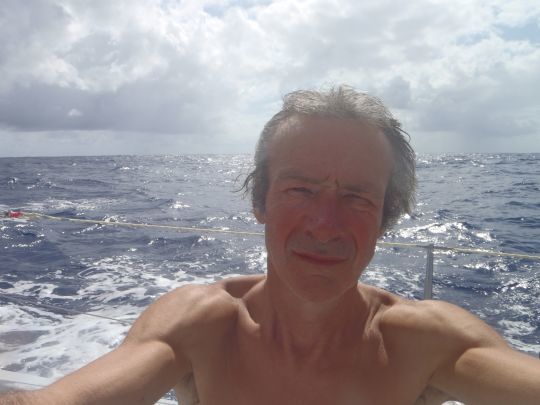
Why take the "Long Road" around the world?
It's a spirit of camaraderie, the idea of sharing an adventure with other people who are going to do the same course. In the first edition, as in the current one, there are very different boats and people. Sailing alone doesn't necessarily mean sailing without others. It's a shared adventure. It's also interesting to meet people who have the same project, to share ideas and experiences. They've made choices about a problem I'm facing.
For the first edition, we met a little before and after. It's interesting to meet the people who are doing this course, who are close to me since we have more or less the same project. It's also about learning from others, seeing the boats and how they're prepared, and exchanging points of view.
The safety issue is not the objective. We've been strongly encouraged to take a tracking beacon, a tracker. It's good for the others, to locate the boats in relation to each other, but also for those who stay ashore. If it turns out that it's also useful for safety, but you shouldn't want it primarily for safety. My position is that of a participant. Some of the participants are going to do some routing, but for me it's a no-go. For me, that would be stealing part of my freedom. When you're solo, you make your own decisions.
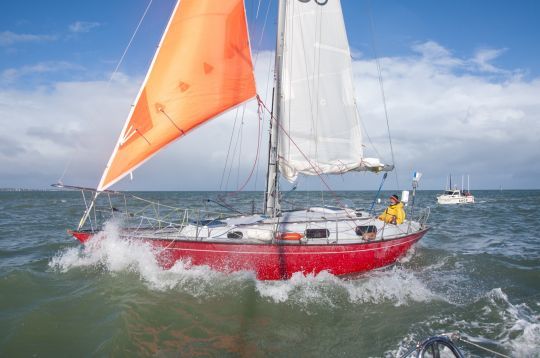
Since there's no notion of competition, is there a quest for performance?
My wife tells me I'm not taking advantage enough. Taking my time on this round-the-world trip is a no. I like the boat to run as smoothly as possible. It's almost as if I were in a race, but with the imperative of sailing well. So I'm not going to force myself. I made good time according to the circumstances I encountered in 2018.
For my first Longue Route, it took me 221 days on a Contessa 32. That's quite a performance all the same. People ask me if I'm going to set a better time. I don't know and that's not the problem. The conditions will be different. What counts is that I got the boat working well. I hate sailing under canvas. I give everything to keep the boat moving. I have no engines and no electric pilot. I only sail with a windvane gear. I have a problem with the engines. It tires me to have the engine running, making noise to recharge the pilot. Then if it breaks down, I don't know how to fix it.
Having only the regulator means that in light airs, I'm at the helm a lot. One hand on the helm and one on the mainsheet. There's no more sleep management. Light airs are the most exhausting. You have to fight to go faster than in heavy weather.
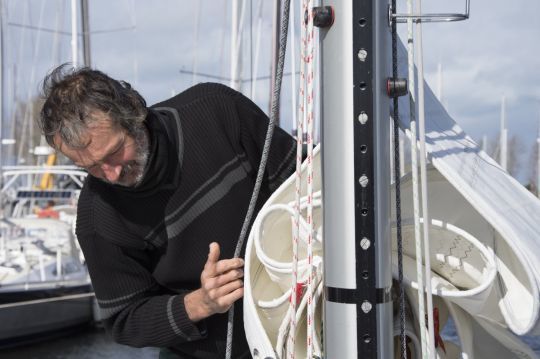
What do you do on board?
I spend all my time making the boat run as smoothly as possible. I don't need to keep myself busy, apart from the pleasure of sailing. Last time I took a 500-page book. I was a philosophy teacher, so I've read a lot in my life. I also play music and I love it, but I don't like mixing genres. I don't want to have music on the boat. With my radio, I can pick up some music if I'm near a coast, but it doesn't last long.
I need to listen to my boat and if I have music on, it cuts me off. When I had the opportunity to read, it was no more than 10 minutes a day. I felt a great sense of luxury because of my involvement in sailing. One of the guys on the Long Route takes 150 books... I've got the whole sea to keep me busy.
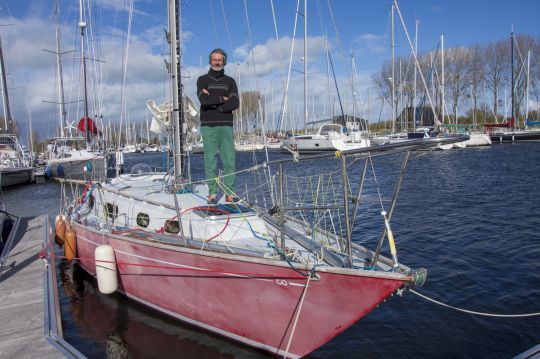
Are you ready with one month to go?
There are still things to do, but I'm well on schedule. I've prepared as well as I could and you're never completely ready. It's like everything else, sporting events, exams... It's important to work hard. I've spent almost all my days on it, so it represents a lot of hours. And I try to be available and enjoy myself.
On any kind of sailing, and even more so on a round-the-world trip, it's too risky to see things from day to day, to adjust. You have to be prepared in every respect: the route, the food, the pharmacy, your physical and mental fitness. The only thing that scares me is having a collision on the way to Lorient, or just after the start. If I dismast, I'll dismast, and another adventure will begin. I'm as prepared as I can be.
